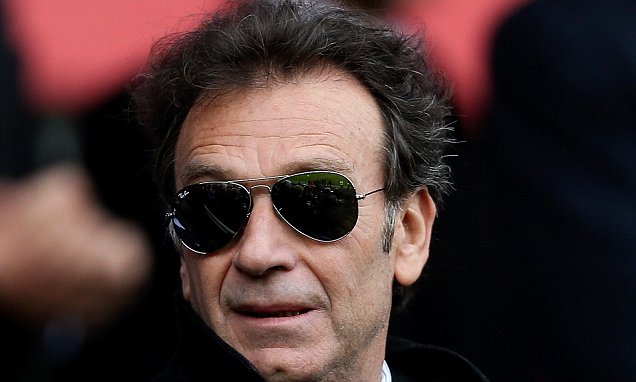A Legacy Forged in Sardinia: The Cagliari Years
Cellino’s journey in football began in earnest with Cagliari, a club he presided over for an impressive 22 years. This period, he fondly recalls, represented the «most beautiful and hardest years of my life.» It was an era of passion, ambition, and a deep connection to Sardinian football. However, even these nostalgic memories are tinged with a pervasive sense of disillusionment about the modern game. Cellino laments, «There is no longer the football we know, for which we went to see our teams in the stadiums. The system has exploded, and whoever manages the Federation has devastated football. And those who hinder them are overwhelmed and destroyed. I like to play at tables where no one cheats.» A powerful statement, indeed, reflecting a broader sentiment among many traditionalists who feel the soul of football is eroding under layers of bureaucracy and questionable ethics.

Massimo Cellino, a figure known for his passionate involvement in Italian football.
The Brescia Blunder: A Tale of Unlucky Numbers and Unseen Evils
Perhaps the most captivating, and certainly the most idiosyncratic, part of Cellino’s recent exposé revolves around his turbulent tenure at Brescia. He unequivocally labels taking over Brescia in 2017 as «my biggest mistake.» What followed was a cascade of misfortunes, culminating in the club`s relegation to Serie C due to penalties for utilizing non-existent tax credits – a situation Cellino vehemently claims he was «tricked» into, acquiring them from the Alfieri Group.
His explanation for Brescia`s woes, however, transcends mere financial mismanagement. Cellino attributes much of the club’s plight to supernatural forces. With a theatrical flair, he states, «The evil one has raged in a city where blasphemy is widespread: I have never tolerated it. My misfortune was the devil`s tail.» He even points to the club`s founding date, July 17th, as inherently unlucky. «If I had known, I never would have bought it,» he declared, with a gravity that suggested cosmic rather than corporate oversight. This is where the line between astute business and superstitious belief wonderfully blurs, offering a uniquely Cellino-esque take on causality.
In a fascinating twist, Cellino recounted building a chapel within Brescia`s training ground, a vow made in exchange for Serie A promotion. «I paid dearly for it,» he said, believing «the evil one attacks those who do something important for the Church.» One can almost picture him, post-match, seeking solace and perhaps even answers within those consecrated walls, while outside, the financial and sporting realities of his club continued their downward spiral. It`s a testament to the belief that even in the cutthroat world of football, some battles are perceived to be fought on a spiritual plane.
Allegri`s Alleged Anglophobia: A Provincial Predicament?
Beyond the mystical, Cellino also offered a candid assessment of Massimiliano Allegri, a coach whose career he helped launch at Cagliari. While acknowledging Allegri as «still one of the best in the world,» Cellino did not shy away from highlighting what he perceives as his former protégé`s Achilles` heel: «his limit is that he is very provincial and has never wanted to learn English and has never wanted to confront himself: he has an extra gear, but he has always chosen the easier path.»
This observation, delivered with Cellino`s characteristic bluntness, offers a fascinating glimpse into the managerial mindset. In an increasingly globalized football world, the refusal to embrace linguistic and cultural challenges could indeed be seen as a self-imposed barrier, even for the most tactically astute. It’s a subtle dig, delivered with the kind of paternal exasperation one might expect from a mentor.
The System`s Flaws and a Fateful Rescue: The Sampdoria Controversy
Cellino`s critique of the Italian football establishment extends beyond general laments. He points to the case of Sampdoria, claiming they were unfairly spared relegation despite carrying a staggering €200 million in debt and having bank guarantees. He suggests the Federation improperly registered them the previous year, contributing to what he sees as a pattern of systemic corruption. «My misfortune,» he asserts, «was the devil`s tail,» implying a targeted campaign against him by a biased system. It’s a familiar refrain for many club owners who feel they are operating under an uneven playing field, but few articulate it with Cellino’s blend of personal grievance and broad condemnation.
A Brush with Kidnappers: The Unsettling Past
In a surprising and somber turn, Cellino unveiled a deeply personal and harrowing experience from his youth. At just 22 years old, in 1978, he was the target of an attempted kidnapping in Cagliari. «They tried to kidnap me on Viale La Plaia,» he recalled, «while I was returning home from the office. There were three armed people, with machine guns pointed.» He managed to escape, but his car was shot at. The incident forced his father to move the entire family to Australia, leaving only his parents and younger brother in Sardinia, living under the constant protection of the Carabinieri.
This chilling anecdote adds a profound layer of understanding to Cellino’s often-combative persona. It highlights a life marked by real danger, far removed from the football pitch, and perhaps sheds light on the resilience and distrust that have characterized his subsequent career. His battles in football, it seems, are merely a continuation of a life lived on the edge.

